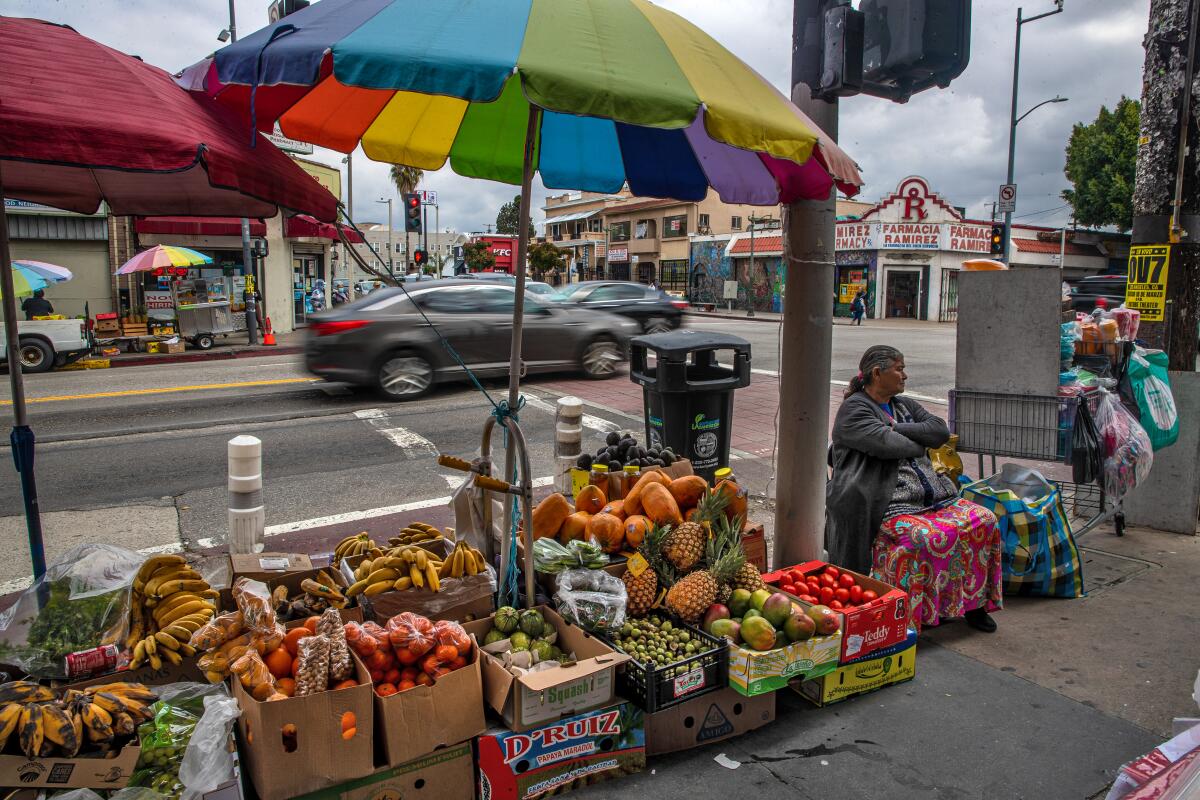L.A. County backs a legal path for street vendors in unincorporated areas

For five years, vendors hawking grilled meats, fresh fruit and used clothes on the streets of unincorporated L.A. County have been stuck in a strange legal gray area: no longer banned, but not yet regulated.
On Tuesday, the L.A. County Board of Supervisors took a major step toward bringing these sellers out of their regulatory limbo, pushing forward a long-awaited ordinance that would set rules for street vending in unincorporated parts of the county.
In 2018, California decriminalized street vending statewide, opening the door for local jurisdictions to create their own laws around who could sell what and where. Since then, at least 16 cities in L.A. County have created their own rules.
“Now the county must do its part,” said Supervisor Hilda Solis, adding she believed the rule change would bring marginalized entrepreneurs, overwhelmingly from Latino and immigrant communities, into the county’s bustling economy.
Fontana is paying a contractor to shut down unlicensed street vendors. City leaders say they’re protecting local businesses. Vendors see an attack on Latino culture.
Under the ordinance, street vendors setting up in unincorporated parts of the county would have to register with the county’s Department of Economic Opportunity, which would enforce the new rules: no blocking the sidewalk, no selling on private property, no excessive littering, to name a few. Vendors could face fines if they don’t comply.
The Board of Supervisors voted 4 to 0 in support of the ordinance, though they will need to take a final vote before it can pass. The ordinance would go into effect six months later.
The supervisors also voted 4 to 0 to move forward on an ordinance from the county’s Department of Public Health that would change how food carts are regulated.
Supervisor Kathryn Barger abstained from both votes.
Barger said she’d heard from business owners who believed the rule change would create an uneven playing field between bricks-and-mortar businesses and street vendors, who she believed would get off relatively easy for violating the rules.
Kelly LoBianco, head of the Department of Economic Opportunity, said the agency would emphasize a “care first” approach to enforcement, meaning the emphasis would be on educating vendors about the new regulations rather than fining them for flouting them.
“I feel that we have not gone far enough,” Barger said. “The penalties don’t meet what we’re requiring for restaurants that can get shut down and lose a day’s business.”
Business owners said they were also concerned about unnavigable streets and trash — problems, they believed, that would not improve unless the county cracked down.
“Without having a rigorous, effective enforcement, nothing’s going to happen,” said Tony DeMarco, a pawnshop owner and president of the Whittier Boulevard Merchants Assn., which opposed the ordinance.
While bricks-and-mortar business owners lamented an uneven playing field, street vendors and their advocates hailed the rules as some of the best they’ve seen since the state decriminalized street vending.
“Our hope is that L.A. County can actually be the model,” said Doug Smith of Inclusive Action, part of a coalition of groups that have advocated for legalization of street vending. “It does not include some of the things we’ve seen that are really intended to keep them out of the system — things like criminal background checks, really high fees or really significant restrictions on locations.”
Smith said, however, that food vendors, in particular, could still face a challenging path to registering with the county as they would need to get a permit from the Department of Public Health, which enforces the state’s retail food code. Food vendors ubiquitous across the county, such as taco stands, have struggled in the past with the agency’s cumbersome rules, and only a small fraction are believed to have the proper permits.
Barbara Ferrer, director of the Public Health Department, emphasized Tuesday that the rule changes under consideration would not apply to “pop-up food stands” — typically larger food operations with big tables and canopies that she said can’t be permitted under state law.
Advocates say some jurisdictions have taken a punitive approach when formalizing rules on street vending. In Fontana, for example, unlicensed sellers could be arrested on misdemeanor charges. The city of Los Angeles, which passed its ordinance in 2018, has been sued over its “no-vending zone” — tourist-friendly areas such as Dodger Stadium and Hollywood Bowl where city officials contend vendors will add to congestion.
Ritu Mahajan Estes of Public Counsel, which represents the vendors suing Los Angeles, said the law firm supports the county’s ordinance, which doesn’t have any significant no-vending zones.
Get the lowdown on L.A. politics
Sign up for our L.A. City Hall newsletter to get weekly insights, scoops and analysis.
You may occasionally receive promotional content from the Los Angeles Times.
She said there were some small tweaks she’d like to see: namely nixing the requirements on distancing. Under the draft ordinance, sidewalk vendors cannot be within 500 feet of a day-care nor farmers market.
“It’s not perfect, but it has a lot of good things,” she said.
Other vendors said they worried about how much it could end up costing them to get licensed. The department says it would need to set the registration fee at $604 to offset the regulatory program costs. Officials say they don’t plan to charge the first year and have found funding that will allow them to charge $100 annually through mid-2028.
Many of the vendors warn that a fee of $600 — if it came to fruition years later— would be a death knell to their business.
“Rent is high. Food is high. The cost of living is high,” Alfredo Gomez, a street vendor in East Rancho Dominguez, told the board through an interpreter. “Please, look at the cost, the fees.”
More to Read
Sign up for Essential California
The most important California stories and recommendations in your inbox every morning.
You may occasionally receive promotional content from the Los Angeles Times.












